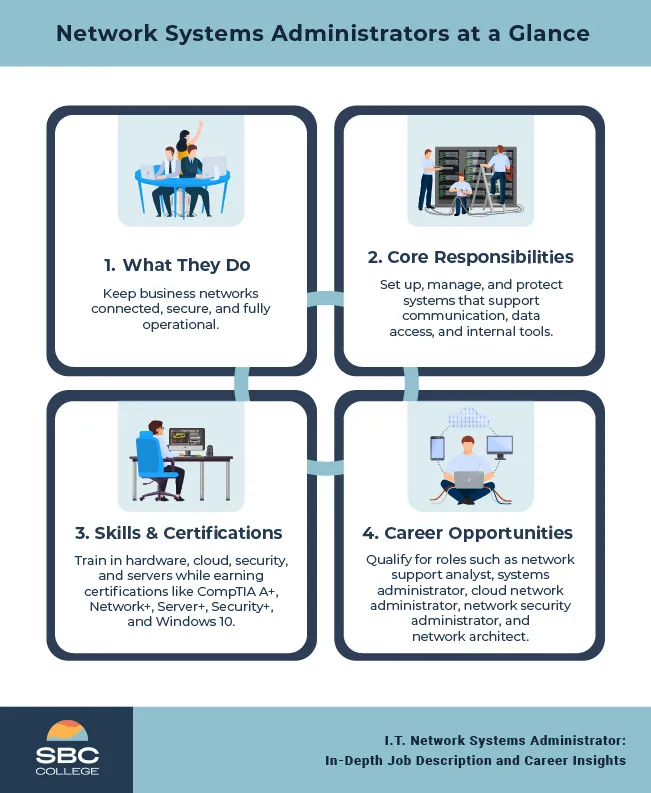Table of Contents
It happens in almost every workplace. You’re trying to upload a file, the share drive stalls, or the meeting platform freezes right before a call. Before it turns into a full-blown disruption, the I.T. network systems administrator is already checking systems, isolating the issue, and restoring access.
By managing network operations behind the scenes, they keep communication flowing, shared files available, and essential business tools up and running.
In this article, you’ll learn what the role of a network systems administrator involves, which skills and certifications are important, and how SBC College can help you get started.
Listen to: I.T. Network Systems Administrator: In-Depth Job Description and Career Insights
What is an I.T. Network Systems Administrator?
An I.T. network systems administrator is responsible for managing the network infrastructure that allows a company’s technology to function effectively. That means connecting computers, mobile devices, servers, and software so teams can collaborate, share information, and remain synchronized across locations.
As Trevor M., SBC College IT Network Systems Administrator program instructor, puts it:
“A successful network administrator needs a strong technical understanding of systems, as well as an awareness of how technology supports the broader goals of modern organizations.
This combination helps create networks that are both reliable and aligned with the company’s needs.”
It’s a role that supports how teams communicate and get things done, whether they’re in the same building or halfway across the world.
Banks, hospitals, universities, businesses, and government offices all rely on secure, well-functioning networks. Network administrators configure those networks, monitor performance, and make upgrades as needed. Their work helps organizations stay connected, secure, and ready for whatever the day brings.
Key Responsibilities of a Network Systems Administrator
The responsibilities of a network systems administrator typically fall into three areas: the installation and improvement of network systems, protecting them from security risks, and helping users stay connected and informed through IT support and network management.
Network Management
Network systems administrators oversee the setup and performance of local area networks (LANs), wide area networks (WANs), and other connected systems. They configure routers, switches, and servers to meet an organization’s specific technical needs, then fine-tune these systems to improve speed, accessibility, and reliability. As businesses grow or adopt new tools, administrators adjust the network to keep everything aligned with daily operations.
Security and Troubleshooting
Administrators also install firewalls, antivirus software, and other tools like security protocols to guard against threats. They continually monitor the system for unusual activity, update software, and remove suspicious access points.
Trevor M. adds, “A network administrator’s ability to predict potential vulnerabilities and implement proactive solutions is what keeps an organization’s data and operations safe from harm.”
When issues occur, such as reduced speeds, lost connections, or glitches, they quickly troubleshoot the problem.
Maintenance and User Support
Regular network maintenance and technical support helps prevent larger issues. Administrators run software updates, manage backups, and assess whether new technologies are worth adding. They also support their teams by answering questions, solving connectivity issues, and training staff on safe practices like ways to avoid phishing scams or using strong passwords. Whether updating the system or walking someone through a fix, they make sure the network stays dependable and user-friendly.
Essential Skills and Certifications

Familiarity with hardware, peripherals, and basic networking
You’ll need to know how to set up and maintain computers, printers, and office networks, along with troubleshooting hardware and connection issues. This includes understanding components like motherboards, processors, RAM, and peripherals to diagnose problems, as well as configuring both wired and wireless networks to maintain system performance.
Familiarity with Windows system configuration and enterprise integration
You should be comfortable setting up Windows systems, configuring devices and storage, managing updates, and supporting enterprise level features like remote access and user authentication.
Knowledge of cloud operations and disaster recovery
Understanding cloud deployment models, securing cloud environments, managing performance baselines, and preparing for system failures are all part of supporting business continuity in cloud-based settings.
Familiarity with cybersecurity principles and threat prevention
This involves identifying threats, applying preventative strategies, and responding to security incidents. It also includes knowledge of authentication, encryption, cloud and wireless protection, and how to build overall system resilience.
CompTIA Network+ certification
Proves your ability to troubleshoot performance issues, support both wired and wireless networks, and apply core network skills in professional settings.
CompTIA Security+ certification
Shows your readiness to apply security best practices and respond to evolving cyber threats in a professional setting.
CompTIA Cloud+ certification
Highlights your ability to work with cloud technologies and support hybrid infrastructures that many organizations rely on today.
Trevor M. highlights “Students at SBC gain hands-on knowledge of the tools and protocols they’ll use every day, ensuring they’re ready to handle the technical demands of the job from day one.”
By training for these essential skills and certifications, you’ll be prepared to troubleshoot systems, support users, and manage the day-to-day demands of IT teams.
Career Path and Growth Opportunities
Training in network systems gives you the foundation to explore different roles in IT network administration based on your interests and long-term career growth goals. Here are some of the paths you can explore:
Network Support Analyst
Monitor and troubleshoot network issues to improve speed, reduce downtime, and support business operations. This role often involves analyzing system data and recommending performance upgrades.
Systems Administrator
Manage the setup, maintenance, and performance of internal systems. This includes configuring servers, installing and updating operating systems, managing user accounts, backing up data, and monitoring storage and resource usage.
Network Security Administrator
Protect networks from threats by managing firewalls, detecting vulnerabilities, and using security tools to prevent breaches.
Cloud Network Administrator:
Manage the software and virtual hardware used in cloud services. This includes cloud system setup, user access, performance monitoring, and security across platforms like Azure.
IT Consultant or Network Architect
For those with experience, this path combines technical expertise with planning and design. You’ll work on building efficient, secure network solutions and offering strategic guidance to businesses on how to meet their goals through technology.
Whether you’re aiming for a technical, security-focused, or leadership role, network systems training builds a foundation that supports growth across multiple areas of the tech industry.

Why Choose SBC College for Network Systems Administration?
Network systems administrators play an important part in how organizations stay connected, protect information, and support daily I.T. operations.
If you’re ready to move into this space with skills that are both practical and in demand, SBC College’s I.T. Network Administrator diploma offers a direct path. The program gives you a solid foundation in hardware, networking, cloud systems, cybersecurity, and server management. As you work through your network administrator program, you’ll also prepare for certifications that many employers recognize, including CompTIA A+, Network+, Security+, Server+, and Microsoft Windows 10.
To help you put these skills into practice, the program includes a practicum placement where you can gain experience in a workplace setting and start building your career.
Contact an admissions advisor to learn more about how to get your IT career started.
Frequently Asked Questions (FAQ)
What does a network systems administrator do?
They manage the systems that connect computers, mobile devices, and software within an organization. Their responsibilities include maintaining networks, securing data, resolving connectivity issues, and supporting users.
What skills are required to become a network systems administrator?
You’ll need knowledge of hardware, networking, cloud systems, cybersecurity, and server management, along with troubleshooting, communication, and problem-solving skills.
What certifications do I need for a career in network administration?
Commonly recognized certifications include CompTIA A+, Network+, Server+, and Security+. Enrolling in a diploma program in I.T. network systems administration prepares you with the skills and knowledge needed to pursue these certifications and succeed in the field.
How much does a network systems administrator earn?
Network systems administrators in Canada typically earn between $20.19 and $52.88 per hour, depending on location and experience.
What career paths are available for network systems administrators?
A network administration career can involve a variety of paths depending on your interests and experience. With the right training, you can pursue roles such as systems administrator, network support analyst, network security administrator, cloud network administrator, or IT consultant.
What is the job outlook for I.T. network systems administrators in 2025?
The employment outlook for network systems administrators in Canada is steady for the 2024-2026 period, with growth driven by increasing demand for computer services, online platforms, and cybersecurity needs.
Why should I choose SBC College for my I.T. education?
SBC College offers focused training, preparation for industry-recognized certifications, and a practicum placement that gives you hands-on experience before graduation. It’s a direct path to building your career in IT networking.






